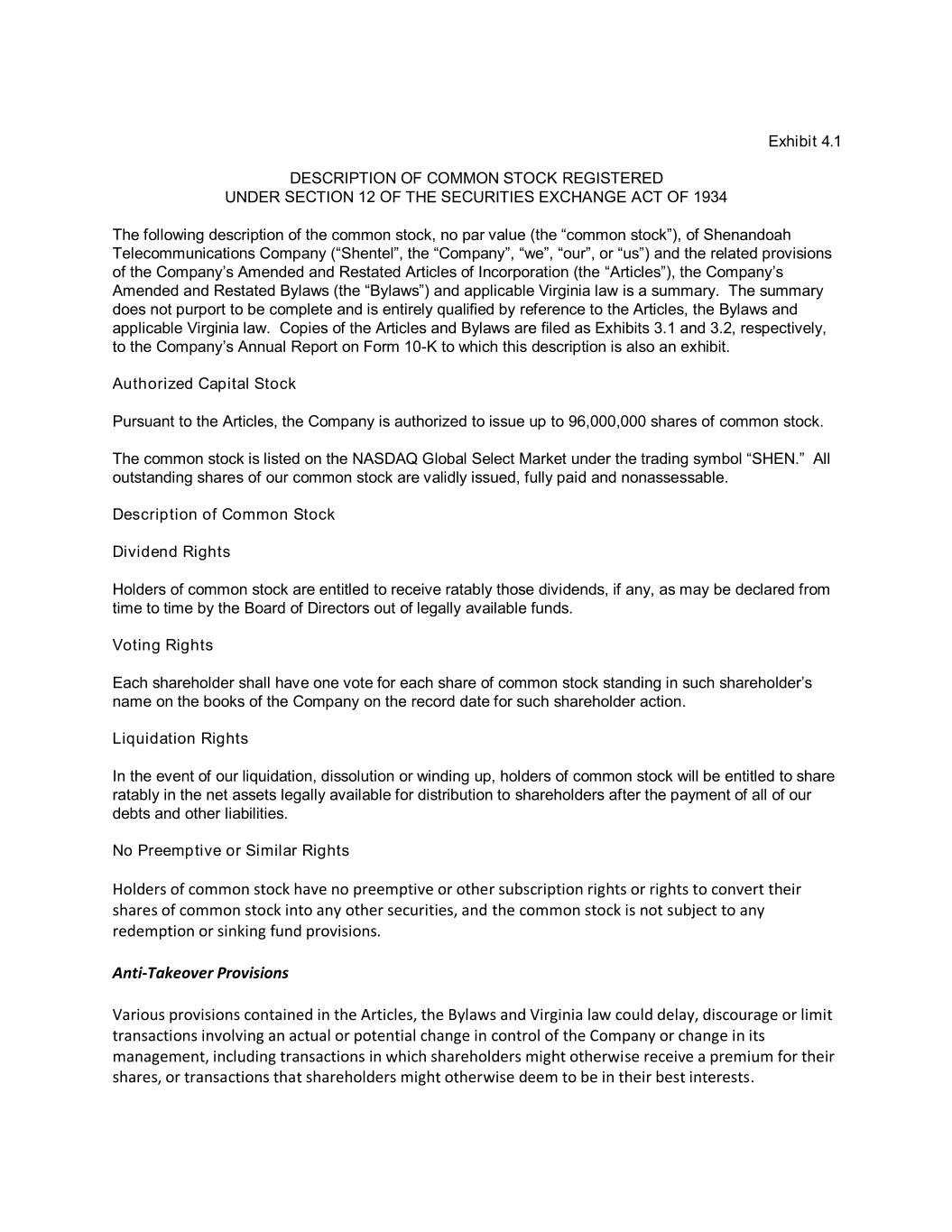
Exhibit 4.1 DESCRIPTION OF COMMON STOCK REGISTERED UNDER SECTION 12 OF THE SECURITIES EXCHANGE ACT OF 1934 The following description of the common stock, no par value (the “common stock”), of Shenandoah Telecommunications Company (“Shentel”, the “Company”, “we”, “our”, or “us”) and the related provisions of the Company’s Amended and Restated Articles of Incorporation (the “Articles”), the Company’s Amended and Restated Bylaws (the “Bylaws”) and applicable Virginia law is a summary. The summary does not purport to be complete and is entirely qualified by reference to the Articles, the Bylaws and applicable Virginia law. Copies of the Articles and Bylaws are filed as Exhibits 3.1 and 3.2, respectively, to the Company’s Annual Report on Form 10-K to which this description is also an exhibit. Authorized Capital Stock Pursuant to the Articles, the Company is authorized to issue up to 96,000,000 shares of common stock. The common stock is listed on the NASDAQ Global Select Market under the trading symbol “SHEN.” All outstanding shares of our common stock are validly issued, fully paid and nonassessable. Description of Common Stock Dividend Rights Holders of common stock are entitled to receive ratably those dividends, if any, as may be declared from time to time by the Board of Directors out of legally available funds. Voting Rights Each shareholder shall have one vote for each share of common stock standing in such shareholder’s name on the books of the Company on the record date for such shareholder action. Liquidation Rights In the event of our liquidation, dissolution or winding up, holders of common stock will be entitled to share ratably in the net assets legally available for distribution to shareholders after the payment of all of our debts and other liabilities. No Preemptive or Similar Rights Holders of common stock have no preemptive or other subscription rights or rights to convert their shares of common stock into any other securities, and the common stock is not subject to any redemption or sinking fund provisions. Anti-Takeover Provisions Various provisions contained in the Articles, the Bylaws and Virginia law could delay, discourage or limit transactions involving an actual or potential change in control of the Company or change in its management, including transactions in which shareholders might otherwise receive a premium for their shares, or transactions that shareholders might otherwise deem to be in their best interests.

Articles and Bylaws. Among other things, the Articles and Bylaws: divide the Board of Directors into three classes, as nearly equal in number as possible, with each class of directors serving for a term expiring at the third annual meeting following their election; provide that any vacancy occurring in the Board of Directors, including a vacancy resulting from an increase in the number of directors, may be filled by the affirmative vote of a majority of the remaining directors of the Board of Directors; provide that only the Chairman of the Board of Directors or a majority of the Board of Directors may call a special meeting of shareholders; require that shareholders seeking to present proposals before a meeting of shareholders or to nominate candidates for election as directors at a meeting of shareholders provide advance written notice in a timely manner, and also specify requirements as to the form and content of a shareholder’s notice; and do not authorize cumulative voting in the election of directors. Virginia Law Affiliated Transactions Statute. The Company is subject to Article 14 of the Virginia Stock Corporation Act (the “VSCA”), a Virginia statute regulating “affiliated transactions.” An affiliated transaction is generally defined as a merger, a share exchange, a material disposition of corporate assets not in the ordinary course of business, any dissolution of the corporation proposed by or on behalf of a holder of more than 10% of any class of the corporation’s outstanding voting shares (a “10% holder”) or any reclassification, including reverse stock splits, recapitalization or merger of the corporation with its subsidiaries, that increases the percentage of voting shares owned beneficially by a 10% holder by more than five percent. In general, these provisions prohibit a Virginia corporation from engaging in affiliated transactions with any 10% holder for a period of three years following the date that such person became a 10% holder unless (1) the board of directors of the corporation and the holders of two-thirds of the voting shares, other than the shares beneficially owned by the 10% holder, approve the affiliated transaction or (2) before the date the person became a 10% holder, the board of directors approved the transaction that resulted in the shareholder becoming a 10% holder. After three years, any such transaction must be at a “fair price,” as described in the VSCA, or must be approved by a majority of the disinterested directors or the holders of two-thirds of the voting shares, other than the shares beneficially owned by the 10% holder. Control Share Acquisitions Statute. Virginia law also contains provisions relating to “control share acquisitions,” which are transactions causing the voting strength of any person acquiring beneficial ownership of shares of a Virginia public corporation to meet or exceed certain threshold percentages (20%, 33⅓% or 50%) of the total votes entitled to be cast for the election of directors. However, the Company has opted out of this Virginia anti-takeover law regulating control share acquisitions. Transfer Agent and Registrar The Company serves as the transfer agent and registrar for the common stock]